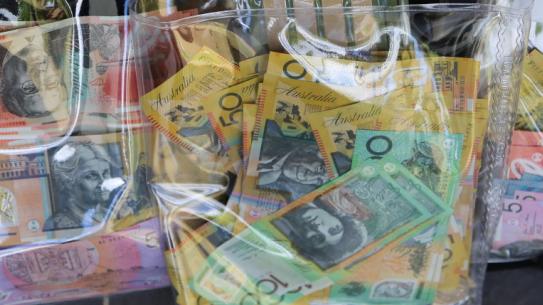Millions seized in illicit cash road trips
There has been a significant rise in cash seizures as state, federal and international law enforcement agencies combine to fight organised crime. `

The Australian Criminal Intelligence Commission chief has confirmed a significant rise in cash seizures as state, federal and international law enforcement agencies combine to fight organised crime.
Commission chief executive Michael Phelan said that “as with legitimate businesses, cash flow is an important aspect of serious and organised crime” and that while Australia was moving towards a cashless society, crime proceeds were typically in paper currency.
“Part of this dramatic increase (in seizures) can be linked to the COVID-19 pandemic. Just like the rest of the community, serious and organised criminals have been forced to adapt quickly to continue their operations,” he said.
“For example, the temporary closure of some businesses due to stay-at-home orders to mitigate the spread of COVID-19 reduced opportunities for criminals to offload cash through casinos and other cash-intensive businesses.
“On top of that, the ability to co-mingle illicit funds through other business channels was also impacted, as substantial fund flows would be obvious during periods of reduced business operation.
“This has in part forced criminals to look to alternative money laundering methodologies, and in some cases forced them to move bulk cash around the country.
“We have adapted in response, to continue to target them and share timely and relevant intelligence and information with our partners.”
In Western Australia, a stunning $50m in cash and hundreds of kilograms of methamphetamine and other drugs was taken from organised crime in just six months as police carried out targeted interceptions of trucks transporting money and drugs.
This included the confiscation in November of $13m from a truck at Coolgardie, 558km east of Perth — Australia’s biggest cash seizure. The previous record was $8.5m in NSW in 2018.
Discussing the seizures, Western Australia Police Force Deputy Commissioner Col Blanch in February said that overseas kingpins were angry and were blaming “bungling bikies”.
National and international law enforcement co-operation was a key to success, with intelligence flowing in from global partners daily, Mr Blanch said.
A strategist from the US Drug Enforcement Administration had even been hired to assist the state protect its borders. The attache, Kevin Merkel, told The Australian the ability of transnational crime groups to move money back and forth had taken a “significant hit”, particularly in WA.
“The seizures that are being had in WA are not seen anywhere else in the world right now. It’s pretty remarkable what they’re pulling off out there,” he said.
Other cash seizures by police in the past year include: $1m from a drug plane in Redcliffe, Queensland; $4.35m from a car stopped in Brisbane; $1.65m from a truck stopped in Port Augusta, South Australia, along with $3.25m of methamphetamine; and $1m from a car stopped in Sydney during a money laundering investigation.
Though the cash seizures are large, they represent only a small fraction of annual spending on illicit drugs. Latest wastewater analysis for the ACIC indicates Australians spent $8.9bn on methamphetamine, cocaine, MDMA and heroin in the year to last August.
ACIC intelligence led to the seizure of $19.23m in cash last financial year.




To join the conversation, please log in. Don't have an account? Register
Join the conversation, you are commenting as Logout